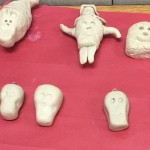For months I knew what the topic of my May blog would be.
When I left my school for spring break, I left a pile of student work on my desk and an open Google doc of qualitative and quantitative data on my laptop. I was in the middle of field-testing a reading strategy with a group of fourth graders and I was scrutinizing the data to see what was working and what wasn’t.
My plan was to make adjustments to the strategy and continue with monitored implementation when we returned from spring break. In the 4 weeks I already committed to this strategy, I was seeing some promising results. There were certain things that weren’t working, but I had a plan for making improvements. I just needed to finalize my plan over spring break. I was excited to make the needed changes I identified.
I never got the chance to execute my revised plan. Instead of continuing the field test, I’m left with incomplete student work and a Google doc with empty space where observational and numerical data should be. Instead of refining the strategy and determining impact, I’m left with partial data and many unanswered questions.
My May blog was going to be about this field test. I was testing a strategy called collaborative reading. I learned about the strategy several months ago and it intrigued me. I planned the field test with the help and support of a mentor teacher and began implementation with one class of fourth graders. Our plan was to monitor the data, make adjustments where necessary, and analyze the impact on students’ reading comprehension. If all went well, we would roll the strategy out to the entire staff in August via professional development.
That’s what my blog would have been about. The field-testing experience and what I learned about the effects of the collaborative reading strategy on student achievement. I planned to share my experience and describe the results we achieved.
I would like to believe I will be able to pick up where I left off when school begins in August. However, I know that may not be possible.
Collaborative reading requires students to work in small groups to analyze and discuss a short excerpt from above grade level text. The teacher is the facilitator, but the students are doing most of the work. They are face to face in very close proximity and there is constant reading and discussion. They will most definitely be breathing on each other.
With the public health crisis of COVID-19, I am now questioning how to move forward. How can I continue with a strategy that was not designed for a social distancing classroom?
As I worried about that dilemma, it got me thinking about other strategies we’ve implemented on my campus and how we can continue them. For example, this year we introduced and implemented Read, Talk, Write with our teachers. Like collaborative reading, this process also requires close proximity for most of its structures.
My school campus has spent many professional development hours focused on strategies and processes that develop and encourage strong classroom discussion. We have invested time in this because we know its effect size on student achievement.
So, in our new (and hopefully brief) reality of public education, I’m left to wonder how to finish the field test I started. Further, how do we continue student discourse practices we already have in place while protecting the health of the students in our care and their families?
My blog this month was supposed to be about my completed field test. But, instead I have unfinished business.
While I’m completely overwhelmed by the idea of reimagining the way these strategies might work, I’m also optimistic we will find a way.
Hmmm…I think I see another field-testing opportunity.










Comments 2
The unfinished business of this year still fills my heart with the aching pressure of deep sadness. It sounds like you have started something really special, and losing the chance to revisit it for some time is really disappointing. I wonder how something like this could work with kids spread in various areas of the room on Chromebooks/iPads simultaneously using a video conferencing app like Zoom (but maybe not Zoom because of the feedback issues). I’m looking forward to hearing how you tackle these challenges and find creative ways to innovate and push forward. I know you will! The truth is, the business IS finished–for now anyways. And as sad as I still feel about that, we have to take a deep breath, let it go (like the song), and emerge with new perspectives going forward. Into the unknown we go!
It’s heartbreaking to think of all the ways the end of the year provides us with results we need to move forward… and how all (or at least most) of those opportunities were lost this year, for both us and the students. The opportunities to celebrate, and to re-configure and improve. It’s also remarkable how many of those opportunities have ZERO to do with standardized testing, and so much to do with reflective cycles of teaching and learning in our classrooms with our students.